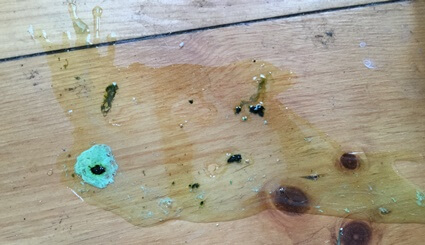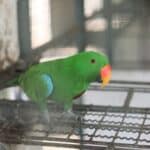Last Updated on March 3, 2024 by Carrie Stephens
No, healthy parrot poop doesn’t smell bad. Of course, the odor of bird feces may be affected by diet.
If a parrot’s poop smells like sulfur, it may have eaten meat with sulfurous amino acids or protein-rich foods like legumes or cruciferous vegetables (broccoli, cabbage, cauliflower, kale, etc.)
If a parrot’s feces smells sour, it may have a bacterial infection. Certain bacteria attack the parrot’s gut, most notably E. Coli, Citrobacter freundii, Streptococcus pyogenes, or Staphylococcus aureus.
Parrot poop that smells like vomit is likely a consequence of internal parasites. Get the parrot assessed by a vet for giardiasis, especially if the droppings are soft and resemble diarrhea.
A sweet, yeast-like parrot poop smell (similar to beer) is from excessive candida in the body. Surplus candida causes candidiasis, a yeast infection in the parrot’s gut shed through feces.
The smell of copper in a parrot’s feces signifies internal bleeding. This is more likely if the droppings also have the color and consistency of blackened tar (dried blood).
Why Parrots’ Poop Smells Weird
The reasons parrot feces has a distinct, unpleasant odor include:
Dietary Adjustments
Sudden dietary changes can lead to strong-smelling parrot poop, especially if you feed them meat. The smell isn’t a concern as long as the droppings are consistent.
According to the Journal of Nutrition, the amino acids methionine, cysteine, homocysteine, and taurine contain high amounts of sulfur. This creates an aroma associated with mammal waste.
Some vegetables, notably dark, leafy greens, can have the same effect due to their protein content.
Introducing diluted apple cider vinegar (ACV) to a parrot’s diet may reduce the smell of sulfur in waste.
ACV diluted in drinking water (never offer pure ACV as this can burn the stomach lining) balances the acids in the gut, reducing the sulfurous aroma in parrot droppings.

Bacterial Infection
Harmful bacteria in parrot feces have a sour stench that’s near-impossible to ignore.
Bacteria can result from consuming tainted food and water, living in unsanitary conditions, or sharing a cage with an infected parrot. Bacteria are often shed through fecal waste.
Vet-prescribed antibiotics are usually required to clear up a bacterial infection.
The bacteria associated with foul-smelling parrot droppings include:
Escherichia coli
Escherichia coli (E. Coli) is a bacteria found in the guts of humans and mammals. A parrot’s digestive tract doesn’t naturally contain E. Coli. It isn’t equipped to cope with E. Coli, so it causes colibacillosis.
ISRN Veterinary Science warns that E. coli infections are common in captive parrots. As they’re usually passed on from a human owner, avoid letting parrots near your mouth.
Citrobacter Freundii
Citrobacter freundii is a bacteria that attacks the internal organs of parrots. There are few warning signs before it causes lung, liver, or kidney failure.
According to Annals of Microbiology, spoiled food (especially meat) is the most common host for Citrobacter freundii. However, it can be found in contaminated water, soil, and plant life.
Antibiotics, including aminoglycosides, chloramphenicol, quinolones, and carbapenems, are available to treat Citrobacter freundii. It’s often resistant to other medications.
Streptococcus Pyogenes
Streptococcus pyogenes is a bacteria that can attach to the gut of parrots.
The symptoms are more commonly associated with respiratory conditions but can be shed through the stool, leading to loose and smelly droppings.
This bacteria isn’t found in parrots. Untreated Streptococcus pyogenes can cause lung scarification. Fortunately, streptococcus pyogenes can be treated with Amoxicillin or penicillin.
Staphylococcus Aureus
The presence of Staphylococcus aureus is usually referred to as a “staph infection.” This infection impacts a parrot’s health, often leading to foul-smelling diarrhea.
With over 36 species and 212 subspecies of staphylococcus, staph infections are common.
The most common cause is unclean living conditions, but it can also follow an injury. Cuts and wounds on a parrot’s body can also invite staphylococcus.
Antibiotics can be ingested orally to treat a staph infection, but a loss of appetite and refusal to hydrate are common side effects. If so, medication will be administered via injection.
Yeast Infection
Candida albicans is a naturally occurring yeast found in the parrot’s body.
A healthy parrot maintains the right level of candida, but the yeast can multiply and cause infection. This may arise in the parrot’s oral cavity, leading to a ‘sour crop.’
In other cases, candida multiplies in the digestive tract. If this occurs, the parrot will shed candida in its droppings. This will create a sickly sweet smell reminiscent of a hop-like beer.
There are many reasons for candida in a parrot’s gut, which include:
- Stress due to inappropriate living conditions.
- Consuming contaminated food or water.
- Excessive carbohydrates.
- Side effects of medications, especially antibiotics.
Excess candida is called candidiasis. A vet will request a tool sample and examine it under a microscope.
Antifungal medications, usually fluconazole, flucytosine, itraconazole, or ketoconazole, will be prescribed. You may need to adjust the parrot’s diet and review its lifestyle and sanitation standards.

Internal Parasites
A parrot with the Giardia duodenalis parasite will develop an infection called giardiasis. This microscopic parasite lives within a parrot’s intestines and eventually sheds in the feces.
Along with the distinctive and unappealing scent of vomit in the droppings, Giardiasis will likely cause diarrhea. The parrot may also show other behaviors and stereotypies associated with parasites.
Poor sanitation is the most common cause of Giardiasis. If several parrots live in a cage that isn’t large enough to accommodate all occupants, Giardiasis will spread.
According to Epidemiology and Infection, substandard water supplies can also lead to Giardiasis.
If a parrot has giardiasis, a vet will prescribe a soluble antiprotozoal medication. This should be added to clean water for up to 7 days. The cage must undergo deep cleaning to remove the Giardia parasite.
Internal Bleeding
The smell of blood in a parrot’s droppings warns that it’s bleeding internally.
Take a close look at the waste and check for signs of blood. This is usually a black, tar-like consistency, although it could also be dark red or brown.
Some of the reasons for internal bleeding include:
- Damage to the cloaca, including prolapse due to chronic egg laying.
- Consumption or inhalation of toxins.
- Malnutrition, notably due to a lack of calcium or vitamin K1.
- After-effects of physical impact trauma.
- Undiagnosed medical issues.
Regularly assessing a parrot’s feces is among the best way to evaluate its health.





